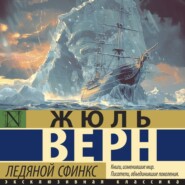По всем вопросам обращайтесь на: info@litportal.ru
(©) 2003-2024.
✖
The Voyages and Adventures of Captain Hatteras
Настройки чтения
Размер шрифта
Высота строк
Поля
"Very likely, Johnson; but the difficulty will be to get to Melville Bay; see how thick the ice is about us! The Forward can hardly make her way through it. See there, that huge expanse!"
"We whalers call that an ice-field, that is to say, an unbroken surface of ice, the limits of which cannot be seen."
"And what do you call this broken field of long pieces more or less closely connected?"
"That is a pack; if it's round we call it a patch, and a stream if it is long."
"And that floating ice?"
"That is drift-ice; if a little higher it would be icebergs; they are very dangerous to ships, and they have to be carefully avoided. See, down there on the ice-field, that protuberance caused by the pressure of the ice; we call that a hummock; if the base were under water, we should call it a cake; we have to give names to them all to distinguish them."
"Ah, it is a strange sight," exclaimed the doctor, as he gazed at the wonders of the northern seas; "one's imagination is touched by all these different shapes!"
"True," answered Johnson, "the ice takes sometimes such curious shapes; and we men never fail to explain them in our own way."
"See there, Johnson; see that singular collection of blocks of ice! Would one not say it was a foreign city, an Eastern city, with minarets and mosques in the moonlight? Farther off is a long row of Gothic arches, which remind us of the chapel of Henry VII., or the Houses of Parliament."
"Everything can be found there; but those cities or churches are very dangerous, and we must not go too near them. Some of those minarets are tottering, and the smallest of them would crush a ship like the Forward."
"And yet men have dared to come into these seas under sail alone! How could a ship be trusted in such perils without the aid of steam?"
"Still it has been done; when the wind is unfavorable, and I have known that happen more than once, it is usual to anchor to one of these blocks of ice; we should float more or less around with them, but we would wait for a fair wind; it is true that, travelling in that way, months would be sometimes wasted where we shall need only a few days."
"It seems to me," said the doctor, "that the temperature is falling."
"That would be a pity," answered Johnson, "for there will have to be a thaw before these masses separate, and float away into the Atlantic; besides, they are more numerous in Davis Strait, because the two stretches of land approach one another between Cape Walsingham and Holsteinborg; but above latitude 67° we shall find in May and June more navigable seas."
"Yes; but we must get through this first."
"We must get through, Doctor; in June and July we should have found the passage free, as do the whalers; but our orders were strict; we had to be here in April. If I'm not very much mistaken, our captain is a sound fellow with an idea firm in his head; his only reason for leaving so early was to go far. Whoever survives will see."
The doctor was right about the falling of the temperature; at noon the thermometer stood at 6°, and a breeze was blowing from the northwest, which, while it cleared the sky, aided the current in accumulating the floating ice in the path of the Forward. It did not all follow the same course; often some pieces, and very high ones, too, floated in the opposite direction under the influence of a submarine current.
The difficulties of this navigation may be readily understood; the engineers had no repose; the engines were controlled from the bridge by means of levers, which started, stopped, and reversed them instantly, at the orders of the officer in command. Sometimes it was necessary to hasten forward to enter an opening in the ice, again to race with a mass of ice which threatened to block up their only egress, or some piece, suddenly upsetting, obliged the brig to back quickly, in order to escape destruction. This mass of ice, carried and accumulated by the great polar current, was hurried through the strait, and if the frost should unite it, it would present an impassable barrier to the Forward.
In these latitudes numberless birds were to be found; petrels and contremaitres were flying here and there, with deafening cries; there were also many gulls, with their large heads, short necks, and small beaks, which were extending their long wings and braving the snow which the storm was whirling about. This profusion of winged beings enlivened the scene.
Numerous pieces of wood were drifting along, clashing continually into one another; a few whales with large heads approached the ship; but they could not think of chasing them, although Simpson, the harpooner, earnestly desired it. Towards evening several seals were seen, which, with their noses just above the water, were swimming among the great pieces of ice.
On the 22d the temperature was still falling; the Forward carried a great deal of steam to reach an easier sailing-place; the wind blew steadily from the northwest; the sails were furled.
During Sunday the sailors had little to do. After divine service, which was read by Shandon, the crew betook themselves to chasing wild birds, of which they caught a great many. These birds, prepared according to Dr. Clawbonny's method, were an agreeable addition to the messes of the officers and crew.
At three o'clock in the afternoon, the Forward sighted the Kin of Sael, which lay east one quarter northeast, and the Mount Sukkertop, southeast one quarter east half-east; the sea was very high; from time to time a dense fog descended suddenly from the gray sky. Notwithstanding, at noon they were able to take an observation. The ship was found to be in latitude 65° 20' and longitude 54° 22'. They would have to go two degrees farther north before they would find clearer sailing.
During the three following days, the 24th, 25th, and 26th of April, they had uninterruptedly to fight with the ice; the management of the engines became very tedious; every minute steam was shut off or reversed, and escaped from the safety-valve.
In the dense mist their approach to the icebergs could be known only by the dull roar of the avalanches; then the vessel would shift its course at once; then there was the danger of running into the masses of frozen fresh water, which were as clear as crystal and as hard as stone. Richard Shandon used to take aboard a quantity of this ice every day to supply the ship with fresh water.
The doctor could not accustom himself to the optical illusions produced by refraction; indeed, an iceberg ten or twelve miles distant used to seem to him to be a small piece of ice close by; he tried to get used to this strange phenomenon, in order to be able by and by to overcome the mistakes of his eyesight.
At last, both by towing the brig along the fields of ice and by pushing off threatening blocks with poles, the crew was thoroughly exhausted; and yet, on the 27th of April, the Forward was still detained on the impassable Polar Circle.
CHAPTER VIII
THE TALK OF THE CREW
Nevertheless, by taking advantages of such openings as there were, the Forward succeeded in getting a few minutes farther north; but, instead of escaping the enemy, it would soon be necessary to attack it; ice-fields of many miles in extent were drawing together, and as these moving masses often represent a pressure of ten millions of tons, they were obliged to take every precaution against being crushed by them. Ice-saws were placed outside the vessel, where they could be used without delay.
Some of the crew endured their hard toil without a murmur, but others complained or even refused to obey orders. While they were putting the saws in place, Garry, Bolton, Pen, and Gripper exchanged their diverse opinions as follows.
"Deuce take it," said Bolton, cheerfully; "I don't know why it just occurs to me that in Water Street there's a comfortable tavern, where one might be very well off between a glass of gin and a bottle of porter. Can you see it from here, Gripper?"
"To tell the truth," answered the sailor who had been addressed, and who generally pretended to be very sullen, "I must say I can't see it from here."
"That's merely your way of talking, Gripper; it is evident that, in those snow towns which Dr. Clawbonny is always admiring, there's no tavern where a poor sailor can moisten his throat with a drink or two of brandy."
"You may be sure of that, Bolton; and you might add that on board of this ship there's no way of getting properly refreshed. A strange idea, sending people into the northern seas, and giving them nothing to drink!"
"Well," answered Garry, "have you forgotten, Gripper, what the doctor said? One must go without spirits if he expects to escape the scurvy, remain in good health, and sail far."
"I don't care to sail far, Garry; and I think it's enough to have come as far as this, and to try to get through here where the Devil doesn't mean to let us through."
"Well, we sha'n't get through," retorted Pen. "O, when I think I have already forgotten how gin tastes!"
"But," said Bolton, "remember what the doctor said."
"O," answered Pen, with his rough voice, "that's all very well to say! I fancy that they are economizing it under the pretext of saving our health."
"Perhaps that devil Pen is right," said Gripper.
"Come, come!" replied Bolton, "his nose is too red for that; and if a little abstinence should make it a trifle paler, Pen won't need to be pitied."
"Don't trouble yourself about my nose," was the answer, for Pen was rather vexed. "My nose doesn't need your advice; it doesn't ask for it; you'd better mind your own business."
"Come, don't be angry, Pen; I didn't think your nose was so tender. I should be as glad as any one else to have a glass of whiskey, especially on such a cold day; but if in the long run it does more harm than good, why, I'm very willing to get along without it."
"You may get along without it," said Warren, the stoker, who had joined them, "but it's not everybody on board who gets along without it."
"What do you mean, Warren?" asked Garry, looking at him intently.
"I mean that for one purpose or another there is liquor aboard, and I fancy that aft they don't get on without it."
"What do you know about it?" asked Garry.
Warren could not answer; he spoke for the sake of speaking.
"You see, Garry," continued Bolton, "that Warren knows nothing about it."
"We whalers call that an ice-field, that is to say, an unbroken surface of ice, the limits of which cannot be seen."
"And what do you call this broken field of long pieces more or less closely connected?"
"That is a pack; if it's round we call it a patch, and a stream if it is long."
"And that floating ice?"
"That is drift-ice; if a little higher it would be icebergs; they are very dangerous to ships, and they have to be carefully avoided. See, down there on the ice-field, that protuberance caused by the pressure of the ice; we call that a hummock; if the base were under water, we should call it a cake; we have to give names to them all to distinguish them."
"Ah, it is a strange sight," exclaimed the doctor, as he gazed at the wonders of the northern seas; "one's imagination is touched by all these different shapes!"
"True," answered Johnson, "the ice takes sometimes such curious shapes; and we men never fail to explain them in our own way."
"See there, Johnson; see that singular collection of blocks of ice! Would one not say it was a foreign city, an Eastern city, with minarets and mosques in the moonlight? Farther off is a long row of Gothic arches, which remind us of the chapel of Henry VII., or the Houses of Parliament."
"Everything can be found there; but those cities or churches are very dangerous, and we must not go too near them. Some of those minarets are tottering, and the smallest of them would crush a ship like the Forward."
"And yet men have dared to come into these seas under sail alone! How could a ship be trusted in such perils without the aid of steam?"
"Still it has been done; when the wind is unfavorable, and I have known that happen more than once, it is usual to anchor to one of these blocks of ice; we should float more or less around with them, but we would wait for a fair wind; it is true that, travelling in that way, months would be sometimes wasted where we shall need only a few days."
"It seems to me," said the doctor, "that the temperature is falling."
"That would be a pity," answered Johnson, "for there will have to be a thaw before these masses separate, and float away into the Atlantic; besides, they are more numerous in Davis Strait, because the two stretches of land approach one another between Cape Walsingham and Holsteinborg; but above latitude 67° we shall find in May and June more navigable seas."
"Yes; but we must get through this first."
"We must get through, Doctor; in June and July we should have found the passage free, as do the whalers; but our orders were strict; we had to be here in April. If I'm not very much mistaken, our captain is a sound fellow with an idea firm in his head; his only reason for leaving so early was to go far. Whoever survives will see."
The doctor was right about the falling of the temperature; at noon the thermometer stood at 6°, and a breeze was blowing from the northwest, which, while it cleared the sky, aided the current in accumulating the floating ice in the path of the Forward. It did not all follow the same course; often some pieces, and very high ones, too, floated in the opposite direction under the influence of a submarine current.
The difficulties of this navigation may be readily understood; the engineers had no repose; the engines were controlled from the bridge by means of levers, which started, stopped, and reversed them instantly, at the orders of the officer in command. Sometimes it was necessary to hasten forward to enter an opening in the ice, again to race with a mass of ice which threatened to block up their only egress, or some piece, suddenly upsetting, obliged the brig to back quickly, in order to escape destruction. This mass of ice, carried and accumulated by the great polar current, was hurried through the strait, and if the frost should unite it, it would present an impassable barrier to the Forward.
In these latitudes numberless birds were to be found; petrels and contremaitres were flying here and there, with deafening cries; there were also many gulls, with their large heads, short necks, and small beaks, which were extending their long wings and braving the snow which the storm was whirling about. This profusion of winged beings enlivened the scene.
Numerous pieces of wood were drifting along, clashing continually into one another; a few whales with large heads approached the ship; but they could not think of chasing them, although Simpson, the harpooner, earnestly desired it. Towards evening several seals were seen, which, with their noses just above the water, were swimming among the great pieces of ice.
On the 22d the temperature was still falling; the Forward carried a great deal of steam to reach an easier sailing-place; the wind blew steadily from the northwest; the sails were furled.
During Sunday the sailors had little to do. After divine service, which was read by Shandon, the crew betook themselves to chasing wild birds, of which they caught a great many. These birds, prepared according to Dr. Clawbonny's method, were an agreeable addition to the messes of the officers and crew.
At three o'clock in the afternoon, the Forward sighted the Kin of Sael, which lay east one quarter northeast, and the Mount Sukkertop, southeast one quarter east half-east; the sea was very high; from time to time a dense fog descended suddenly from the gray sky. Notwithstanding, at noon they were able to take an observation. The ship was found to be in latitude 65° 20' and longitude 54° 22'. They would have to go two degrees farther north before they would find clearer sailing.
During the three following days, the 24th, 25th, and 26th of April, they had uninterruptedly to fight with the ice; the management of the engines became very tedious; every minute steam was shut off or reversed, and escaped from the safety-valve.
In the dense mist their approach to the icebergs could be known only by the dull roar of the avalanches; then the vessel would shift its course at once; then there was the danger of running into the masses of frozen fresh water, which were as clear as crystal and as hard as stone. Richard Shandon used to take aboard a quantity of this ice every day to supply the ship with fresh water.
The doctor could not accustom himself to the optical illusions produced by refraction; indeed, an iceberg ten or twelve miles distant used to seem to him to be a small piece of ice close by; he tried to get used to this strange phenomenon, in order to be able by and by to overcome the mistakes of his eyesight.
At last, both by towing the brig along the fields of ice and by pushing off threatening blocks with poles, the crew was thoroughly exhausted; and yet, on the 27th of April, the Forward was still detained on the impassable Polar Circle.
CHAPTER VIII
THE TALK OF THE CREW
Nevertheless, by taking advantages of such openings as there were, the Forward succeeded in getting a few minutes farther north; but, instead of escaping the enemy, it would soon be necessary to attack it; ice-fields of many miles in extent were drawing together, and as these moving masses often represent a pressure of ten millions of tons, they were obliged to take every precaution against being crushed by them. Ice-saws were placed outside the vessel, where they could be used without delay.
Some of the crew endured their hard toil without a murmur, but others complained or even refused to obey orders. While they were putting the saws in place, Garry, Bolton, Pen, and Gripper exchanged their diverse opinions as follows.
"Deuce take it," said Bolton, cheerfully; "I don't know why it just occurs to me that in Water Street there's a comfortable tavern, where one might be very well off between a glass of gin and a bottle of porter. Can you see it from here, Gripper?"
"To tell the truth," answered the sailor who had been addressed, and who generally pretended to be very sullen, "I must say I can't see it from here."
"That's merely your way of talking, Gripper; it is evident that, in those snow towns which Dr. Clawbonny is always admiring, there's no tavern where a poor sailor can moisten his throat with a drink or two of brandy."
"You may be sure of that, Bolton; and you might add that on board of this ship there's no way of getting properly refreshed. A strange idea, sending people into the northern seas, and giving them nothing to drink!"
"Well," answered Garry, "have you forgotten, Gripper, what the doctor said? One must go without spirits if he expects to escape the scurvy, remain in good health, and sail far."
"I don't care to sail far, Garry; and I think it's enough to have come as far as this, and to try to get through here where the Devil doesn't mean to let us through."
"Well, we sha'n't get through," retorted Pen. "O, when I think I have already forgotten how gin tastes!"
"But," said Bolton, "remember what the doctor said."
"O," answered Pen, with his rough voice, "that's all very well to say! I fancy that they are economizing it under the pretext of saving our health."
"Perhaps that devil Pen is right," said Gripper.
"Come, come!" replied Bolton, "his nose is too red for that; and if a little abstinence should make it a trifle paler, Pen won't need to be pitied."
"Don't trouble yourself about my nose," was the answer, for Pen was rather vexed. "My nose doesn't need your advice; it doesn't ask for it; you'd better mind your own business."
"Come, don't be angry, Pen; I didn't think your nose was so tender. I should be as glad as any one else to have a glass of whiskey, especially on such a cold day; but if in the long run it does more harm than good, why, I'm very willing to get along without it."
"You may get along without it," said Warren, the stoker, who had joined them, "but it's not everybody on board who gets along without it."
"What do you mean, Warren?" asked Garry, looking at him intently.
"I mean that for one purpose or another there is liquor aboard, and I fancy that aft they don't get on without it."
"What do you know about it?" asked Garry.
Warren could not answer; he spoke for the sake of speaking.
"You see, Garry," continued Bolton, "that Warren knows nothing about it."

















